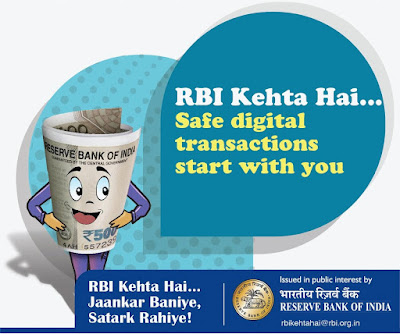Many instances of people being duped, through online transactions, are reported in the media every day.
It is indeed unfortunate that such incidents happen and that too so frequently.
Fortunately, you can protect your hard-earned money by taking some very simple precautions.
RBI, banks, and many other agencies are 'continuously and actively undertaking digital awareness campaigns'. All we need is to pay attention and follow the guidelines suggested.
If you don't keep your home locked, you cannot blame the thieves or the police, for your negligence.
Likewise, if you don't keep your online transactions locked, you cannot blame the banks or other authorities, for your negligence.
Here's the list of some of the basic things you MUST ALWAYS do.
1. Do not share your ATM / Card (Debit / Credit / Prepaid) details with ANYONE (not even the bank officials).
2. Do not share your Password, PIN, OTP, CVV, UPI-PIN, etc. with ANYONE (not even the bank officials).
3. Avoid making any banking or other financial transactions through public, open or free wifi-networks.
4. Do not store important banking data on the mobile, e-mail, electronic wallet or purse.
5. Remember that banks or any other agency will never ask for details such as password, PIN, OTP, CVV number.
6. Beware of fictitious emails. Do not open any links received in messages and emails.
7. Do not download any spurious apps that access critical information stored on your devices.
8. Do not be lured by fake gifts, job offers, money transfer, or such other inducements.
9. Do not be threatened by account update/closure, incomplete KYC, virus warnings, blocked cards, etc. Always visit the branch personally and get the matters sorted out with genuine officials.
10. Be very careful about the fake websites of banks etc. and the callers impersonating as bank officials. Use only verified, secure, and trusted websites, i.e. websites starting with https://.
11. Do not transfer any money to any 'unknown' person, especially the so-called Facebook, Instagram, or Whatsapp friends.
12. Change your online banking password and PIN as often as feasible. Block your ATM Card, Credit Card, Prepaid Card immediately, if it is lost or stolen.
And, if despite all precautions, you do become the victim of online fraud, notify your bank ASAP. Similar 'fast' action is required for your mobile wallets too.
The safety of your money is in your hands.
Must read: RBI Cautions...
I repeat... the safety of your money is in your hands.
It is indeed unfortunate that such incidents happen and that too so frequently.
Fortunately, you can protect your hard-earned money by taking some very simple precautions.
RBI, banks, and many other agencies are 'continuously and actively undertaking digital awareness campaigns'. All we need is to pay attention and follow the guidelines suggested.
If you don't keep your home locked, you cannot blame the thieves or the police, for your negligence.
Likewise, if you don't keep your online transactions locked, you cannot blame the banks or other authorities, for your negligence.
Here's the list of some of the basic things you MUST ALWAYS do.
1. Do not share your ATM / Card (Debit / Credit / Prepaid) details with ANYONE (not even the bank officials).
2. Do not share your Password, PIN, OTP, CVV, UPI-PIN, etc. with ANYONE (not even the bank officials).
3. Avoid making any banking or other financial transactions through public, open or free wifi-networks.
4. Do not store important banking data on the mobile, e-mail, electronic wallet or purse.
5. Remember that banks or any other agency will never ask for details such as password, PIN, OTP, CVV number.
6. Beware of fictitious emails. Do not open any links received in messages and emails.
7. Do not download any spurious apps that access critical information stored on your devices.
8. Do not be lured by fake gifts, job offers, money transfer, or such other inducements.
9. Do not be threatened by account update/closure, incomplete KYC, virus warnings, blocked cards, etc. Always visit the branch personally and get the matters sorted out with genuine officials.
10. Be very careful about the fake websites of banks etc. and the callers impersonating as bank officials. Use only verified, secure, and trusted websites, i.e. websites starting with https://.
11. Do not transfer any money to any 'unknown' person, especially the so-called Facebook, Instagram, or Whatsapp friends.
12. Change your online banking password and PIN as often as feasible. Block your ATM Card, Credit Card, Prepaid Card immediately, if it is lost or stolen.
And, if despite all precautions, you do become the victim of online fraud, notify your bank ASAP. Similar 'fast' action is required for your mobile wallets too.
The safety of your money is in your hands.
Must read: RBI Cautions...
I repeat... the safety of your money is in your hands.





